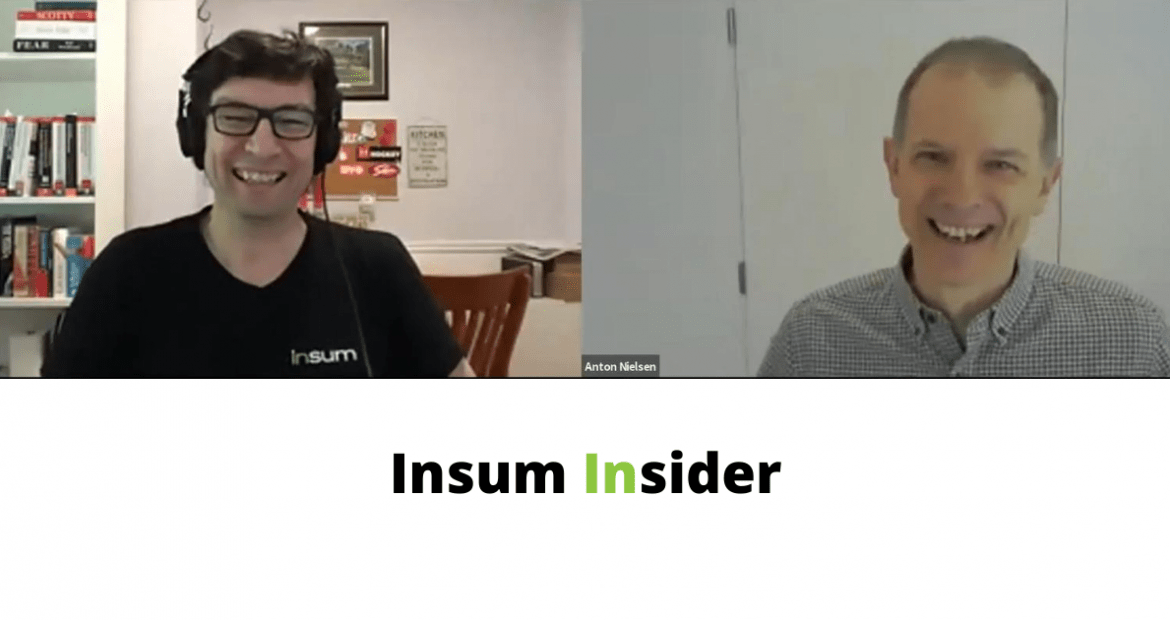In our sixth Insum Insider episode, Oracle ACEs Sylvain Martel and Anton Nielsen lead a lively session on EBS extensions with APEX.
Episode Show Notes:
This was a very lively session on EBS extensions with APEX, thanks to excellent audience participation! Due to time constraints, several questions had to be moved over to the Insum Insider Forum where they were answered by our panelists.
Our hosts Monty and Michelle opened the session and introduced the episode’s panelists: Oracle E-Business Suite-APEX Practice Director and Oracle ACE Sylvain Martel, as well as Oracle ACE Anton Nielsen, Insum’s Vice-President of Consulting Services.
Early Experiences with EBS
4:00 – Monty asks the Sylvain and Anton to describe their experience with Oracle EBS and EBS extensions
Anton talked about his early experience at Oracle building the EBS grant module, as well as his consultation experience building EBS extensions using various application development frameworks, before settling on Oracle APEX.
He also discussed the Single Sign-on connector for EBS which he developed as an alternative to the Oracle product for SSO (Oracle Access Manager) that was available at the time.
7:30 – Sylvain describes his involvement in EBS, at first developing extensions with Oracle Forms, then with OAF (Oracle Application Framework). He recounts his discovery of Oracle APEX and exploring its capabilities with Insum. Sylvain tips his hat to Anton for building the SSO product Insum uses today.
14:35 – Sylvain and Anton field the first question from a participant concerning the level of EBS knowledge need to implement an APEX solution for EBS. Anton recommended using the published views and APIs and also underscored the need for an EBS functional subject matter expert to act as a reference.
18:17 – Anton talks about the longevity of APEX and the APEX Team at Oracle, and how their experience has helped in dealing with the multiple technologies built into EBS over the years.
Sylvain agrees, citing EBS business reporting modules as an example.
SSO
24: 05 – Sylvain presents Anton’s SSO Admin application built for APEX 4.2, identifying it as the foundation for Insum’s SSO solution. he highlights its responsive design, the fact that it is decoupled from EBS, and that it generates tokens.
The two discuss this and the latest version of the package that Sylvain built.
Sylvain also presents a slide to explain the handshake process between EBS and APEX.
30:43 – Anton and Sylvain field a participant question on session control.
Examples of Applying an APEX Extension to EBS
37:22 – Monty asks for specific examples of applying an APEX extension to EBS.
Sylvain demonstrates an example of a popular dashboard application built with APEX called “Supplier Scorecard”, which allows detailed drill down, thanks to APEX Interactive Reports.
Anton provides two use cases: 1. A public-facing EBS application to pay invoices online (Sylvain shows the example of Oracle’s Web Store, an APEX application that writes back to E-Business Suite. 2. High-usage applications for internal resources for tasks that need to be done quickly. Taking down customer complaints or taking orders, for example.
43:48 – Sylvain demonstrates a use case for APEX used within the context of Oracle Fusion Applications. Sylvain mentions that the APEX app uses the single sign-on application that Anton originated.
Anton comments that Fusion produces RESTful services and that APEX has recently been focused on consuming RESTful services.
Sylvain mentions that although the APEX application works with Fusion, it can also work with any SaaS application, so long as the latter provides APIs.
Sylvain also mentions that the APEX application is running on Oracle’s Autonomous Cloud.
